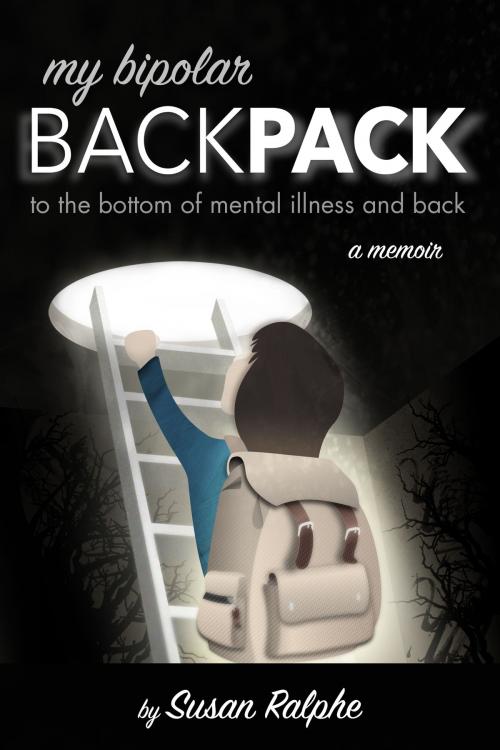| Author: | Susan Ralphe | ISBN: | 9781310202476 |
| Publisher: | Susan Ralphe | Publication: | November 25, 2014 |
| Imprint: | Smashwords Edition | Language: | English |
| Author: | Susan Ralphe |
| ISBN: | 9781310202476 |
| Publisher: | Susan Ralphe |
| Publication: | November 25, 2014 |
| Imprint: | Smashwords Edition |
| Language: | English |
In this powerful memoir Susan Ralphe employs sharp storytelling skills honed over a
long, newspaper-reporting career to tell her own story of long-term, heart-wrenching bipolar
madness.
My Bipolar Backpack begins shortly before the first of two stays in mental hospitals and
ends as she serves in elective office. Sandwiched in between are incidents from a troubled
childhood, a brain that regularly froze during her college years, employment nightmares,
misdiagnosis, suicide attempts, a marriage rocked by mental illness in Susan and alcoholism
in her husband, and mothering failures.
The first chapter gives readers a snapshot view of how it feels to be under the grip of a
manic attack.
“Without warning invisible bands inside my head often tightened until the pressure
became unbearable. It sometimes worsened almost to the point that I thought my head was
going to explode.
“Simultaneously my thoughts raced as though my brain were continually in fast-forward
mode, while my ability to think decelerated. I vividly pictured my brain curling up
into a fetal position…”
Susan recounts how telling staff at the first mental hospital that her husband was the
one who was “crazy,” landed her in a locked unit, the end of the line for the mentally ill.
Terror greeted her at the door in the form of a young woman wearing a football helmet who
hit and kicked Susan as she walked in, and the nurse behind a tall, plastic enclosure who
ignored what was going on. The author describes her unwillingness or inability to talk about
what was troubling her and her resultant discharge with the wrong diagnosis and red-hot
bipolar disorder boiling under the surface, ready to erupt again.
This is a story of soaring accomplishment alternating with black periods of tenseness,
brain freeze, and despair. A little girl who ran home from kindergarten daily during recess
because she feared her mother was going to die, is transformed into valedictorian of her high school
graduating class, then into a college student who was seriously mentally ill. The next
character is a happy bride and new mother who subsequently falls apart under the weight of
her husband’s alcoholism and her younger son’s asthma.
For most of her life, Susan explains, she carefully hid her bipolar disorder from
anyone she could, fearing the stigma that could deliver a second punch to someone already
reeling from illness itself.
In the pages of this memoir the author summons the strength to share her experiences,
confident that other bipolar individuals can find hope and healing in her tale and that their
families, as well as mental health professionals, can gain knowledge and understanding.
She says she dreams of the day when bipolar sufferers will no longer think they must
carry the heavy “bipolar backpacks” in which they hide their disease.
The author grew up in Michigan’s Upper Peninsula, graduated from Northern
Michigan University, and worked as a reporter for newspapers in Minnesota and Arizona
including The Duluth Herald and The Phoenix Gazette. She was married for 38 years to her
late husband, Roger, and has two grown sons and nine grandchildren. She presently resides in
the Portland, OR, area.
In this powerful memoir Susan Ralphe employs sharp storytelling skills honed over a
long, newspaper-reporting career to tell her own story of long-term, heart-wrenching bipolar
madness.
My Bipolar Backpack begins shortly before the first of two stays in mental hospitals and
ends as she serves in elective office. Sandwiched in between are incidents from a troubled
childhood, a brain that regularly froze during her college years, employment nightmares,
misdiagnosis, suicide attempts, a marriage rocked by mental illness in Susan and alcoholism
in her husband, and mothering failures.
The first chapter gives readers a snapshot view of how it feels to be under the grip of a
manic attack.
“Without warning invisible bands inside my head often tightened until the pressure
became unbearable. It sometimes worsened almost to the point that I thought my head was
going to explode.
“Simultaneously my thoughts raced as though my brain were continually in fast-forward
mode, while my ability to think decelerated. I vividly pictured my brain curling up
into a fetal position…”
Susan recounts how telling staff at the first mental hospital that her husband was the
one who was “crazy,” landed her in a locked unit, the end of the line for the mentally ill.
Terror greeted her at the door in the form of a young woman wearing a football helmet who
hit and kicked Susan as she walked in, and the nurse behind a tall, plastic enclosure who
ignored what was going on. The author describes her unwillingness or inability to talk about
what was troubling her and her resultant discharge with the wrong diagnosis and red-hot
bipolar disorder boiling under the surface, ready to erupt again.
This is a story of soaring accomplishment alternating with black periods of tenseness,
brain freeze, and despair. A little girl who ran home from kindergarten daily during recess
because she feared her mother was going to die, is transformed into valedictorian of her high school
graduating class, then into a college student who was seriously mentally ill. The next
character is a happy bride and new mother who subsequently falls apart under the weight of
her husband’s alcoholism and her younger son’s asthma.
For most of her life, Susan explains, she carefully hid her bipolar disorder from
anyone she could, fearing the stigma that could deliver a second punch to someone already
reeling from illness itself.
In the pages of this memoir the author summons the strength to share her experiences,
confident that other bipolar individuals can find hope and healing in her tale and that their
families, as well as mental health professionals, can gain knowledge and understanding.
She says she dreams of the day when bipolar sufferers will no longer think they must
carry the heavy “bipolar backpacks” in which they hide their disease.
The author grew up in Michigan’s Upper Peninsula, graduated from Northern
Michigan University, and worked as a reporter for newspapers in Minnesota and Arizona
including The Duluth Herald and The Phoenix Gazette. She was married for 38 years to her
late husband, Roger, and has two grown sons and nine grandchildren. She presently resides in
the Portland, OR, area.















